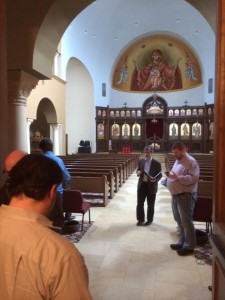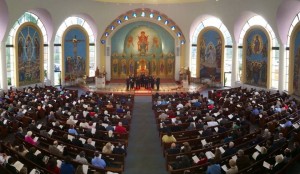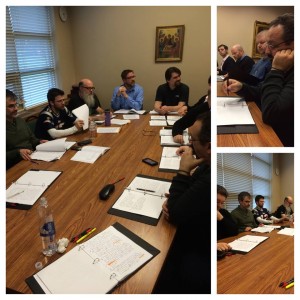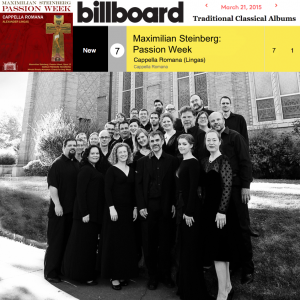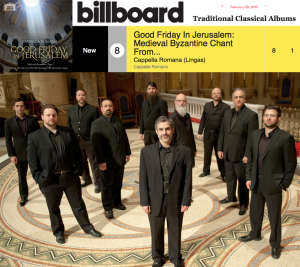 Alexander Lingas led the vocal ensemble Cappella Romana recently performed medieval Byzantine chant to large and enthusiastic audiences in the Southeast and Northwest regions of the USA. Recent City graduate Spyridon Antonopoulos was a soloist in all these performances.
Alexander Lingas led the vocal ensemble Cappella Romana recently performed medieval Byzantine chant to large and enthusiastic audiences in the Southeast and Northwest regions of the USA. Recent City graduate Spyridon Antonopoulos was a soloist in all these performances.
They performed “Good Friday in Jerusalem,” a programme that the ensemble had previously recorded at Stanford Memorial Church and was released on February 10th of this year, immediately reaching #1 on Amazon’s Vocal and Opera charts and opening at #8 on the Billboard Classical charts.
“Good Friday in Jerusalem,” features Medieval Byzantine Chant from the Typikon of the Anastasis (the Church of the Holy Sepulchre), including works by Kosmas the Melodist (8th century), Romanos the Melodist (6th century), Theophanes Protothronos (9th century), and Leo VI the Wise (866–912).
The first performance in the South was in Charlotte, NC on Friday, 13 March at St. Nektarios Greek Orthodox Church
The next day the group travelled to Atlanta, GA, where on Saturday, 14 March they performed at Annunciation Greek Orthodox Cathedral
On Sunday morning the ensemble chanted morning services for over three hours (Matins, a hierarchical Divine Liturgy celebrated by His Eminence Metropolitan Alexios, and an Ordination to the Priesthood) at Annunciation Cathedral.
A few weeks before the ensemble had presented three performances of the same programme on the opposite coast of the USA in Portland, Oregon and Seattle Washington:
James McQuillen of Oregon Artswatch wrote the following about the Portland performances:
“On a strictly sonic level, the concert at Portland’s Trinity Episcopal Cathedral was magnificent … As with last year’s concerts of Finnish Orthodox music, it was especially satisfying to hear the singers perform music they’d already worked to a fine polish for committing to disc. The ten men filled the space with dark resonance, making effortless work of melismatic unison melodies and rock-solid drones, and the pacing was measured but unflagging. … The concert also invited a listener to delve into the expressive potential of this ancient music, a kind of artistic expression that, because the rigors and self-negating ethos of the medieval church are worlds away from the nakedly personal poetry of, say, Schubert, we have little ability to grasp. But it was impossible not to hear the laments of Mary at the foot of the cross and not be moved. … Good Friday in Jerusalem went deep, and it sounded close to the spring from which poured centuries of sacred music.”
Read the full review on Oregon Artswatch
Video from the performance at Trinity Episcopal Cathedral in Portland, Oregon:

